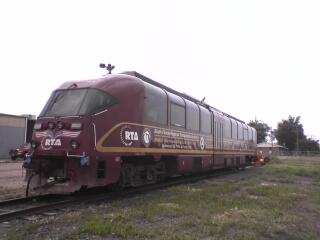Company To Supply KRM Train Sets Closes Doors

DMU
Colorado Railcar Manufacturing, the company slated to provide the train sets for the potential Kenosha-Racine-Milwaukee (KRM) commuter rail line, has closed its doors due to a liquidity problem. The company was the only supplier of diesel multiple unit (DMU) trains that met FRA standards to operate on the same tracks as freight trains. So the battle over a recently released (and highly-flawed in our opinion) cost report might have to be tabled at this point.
Does this mean that the KRM line has no chance of going forward? Absolutely not. We still think Governor Jim Doyle should include the ability for the RTA to collect up to a .5% sales tax in his budget proposal, due out sometime in mid-to-late January. The lack of an American manufacturer of DMU’s that meet FRA’s standards is a void that will likely be filled by the market, especially as more and more metro areas aim to start new commuter rail programs.
To understand the importance of Colorado Railcar, it’s important to look at the laws and options surrounding transit systems. Fortunately Fred Hanson, General Manager of Tri-Met in Oregon, wrote a great article breaking down why DMU’s from Colorado Railcar are important to new transportation systems.
Fact No. 1: In purchasing the railcars for WES, TriMet had to comply with the federal Buy America law. Only one American firm — Colorado Railcar Manufacturing — manufactures the vehicles we needed.
Fact No. 2: The Diesel Multiple Unit trains selected for WES are the only ones that meet federal safety standards allowing commuter trains to operate with active freight trains. Portland & Western Railroad controls the tracks upon which the WES trains will operate, and the company required that freight trains continue to operate on the tracks along with commuter trains. The DMU trains were also selected for this corridor because they provide for ease of operation (an operator cab at both ends), their size fits the Beaverton Transit Center, and TriMet can add future service outside the current “rush-hour only” schedule and safely share the tracks with freight trains.
What’s the solution?
I think it’s time for the state of Wisconsin and the City of Milwaukee to look at supporting Super Steel, our local railcar manufacturer (for clients such as Metra) to become a manufacturer of DMU trainsets. Not only may it position Milwaukee to be a leader in the industry, but it will put more people to work in Milwaukee.






















Another (admittedly more expensive, but far more bold) option would be to build a parallel light rail line on the former TMER&L MRK right of way or on the Southern Pacific (former C&NW) right of way where room permits. Separating the passenger line from the fright line would allow use units such as the Alstom CITADIS Dualis. With a short connector through farm land, the former TMER&L MRK and North Shore right of ways could be used to snake the north end past the Amtrak Airport station and into downtown.
In the long run, an electric traction solution will cost less. Operating and maintenance cost for electric powered traction is lower than diesel. Because electric powered units have faster acceleration and require less time for fueling and start-up, less equipment can be used to provide the same level of service. Wind generators with superconducting magnetic energy storage (SMES) system could be placed along the rural portions of the line, making it a carbon free commuter line.
The CITADIS units could then terminate on the north on the proposed downtown Milwaukee trolley loop and on the south on the Kenosha trolley loop.
Wind with SMES is technology being pioneered at Wisconsin Power and Light’s Cedar Ridge wind farm.
This kind of project would put Wisconsin at the forefront of modern transportation technology.
Ref:
Article on wind and SMES:
http://www.designnews.com/article/48883-Engineers_Search_for_Electrical_Storage_Solution.php
Portions of the abandoned MRK being used as a bike trail:
http://www.fuzzyworld3.com/bicycling3/maps/mrktrail.html
CITADIS equipment in action:
http://www.transport.alstom.com/_eLibrary/picture/pictureHighResolution_112524.jpg
CITADIS Dualis specifications:
http://www.transport.alstom.com/home/elibrary/technical/products/32031.EN.php?languageId=EN&dir=/home/elibrary/technical/products/&idRubriqueCourante=13957
MRK Line book with pictures:
http://books.google.com/books?id=W0vOxeEZO3EC&pg=PA43&lpg=PA43&dq=TMER%26L+MRK+line+map&source=web&ots=KxXgztJUMd&sig=EnJwocozHkvO1pJR78DO3bv6rWc&hl=en&sa=X&oi=book_result&resnum=1&ct=result#PPA5,M1
My google map:
http://maps.google.com/maps/ms?ie=UTF8&hl=en&msa=0&msid=107949597789535800481.00044e4cead8a86f8c3a0&ll=42.789354,-87.883759&spn=0.68832,1.851196&z=10